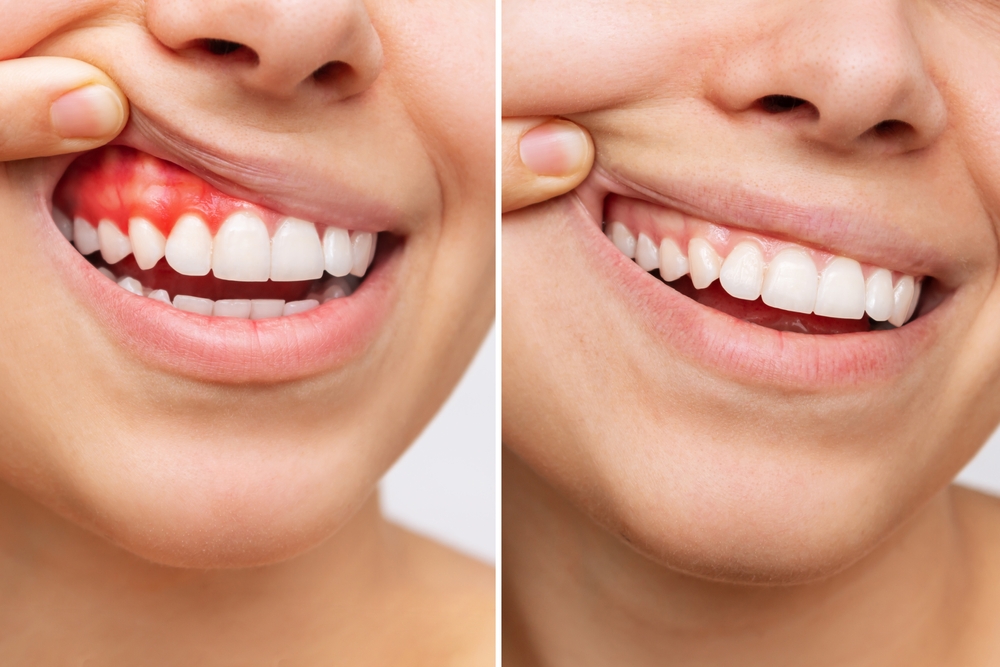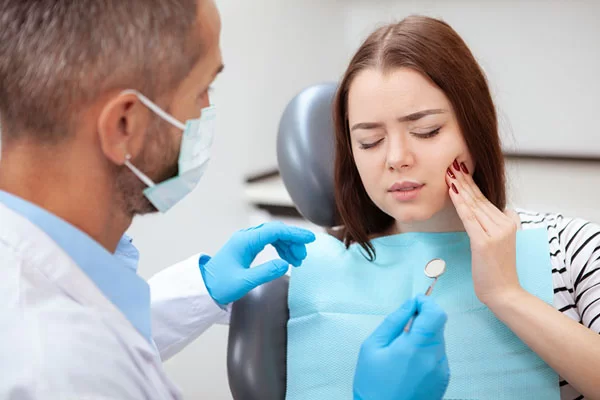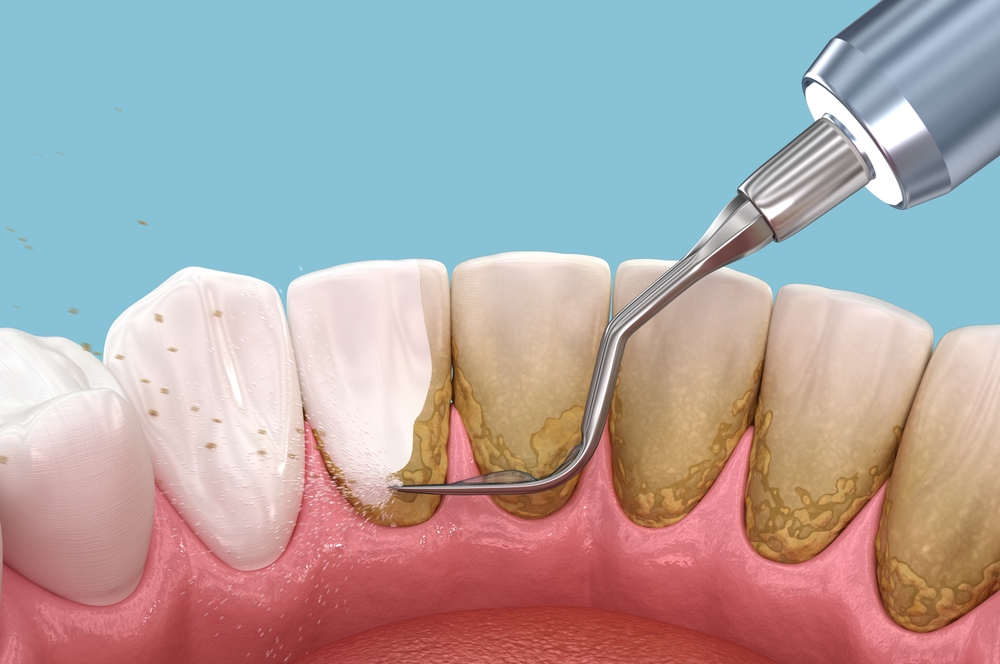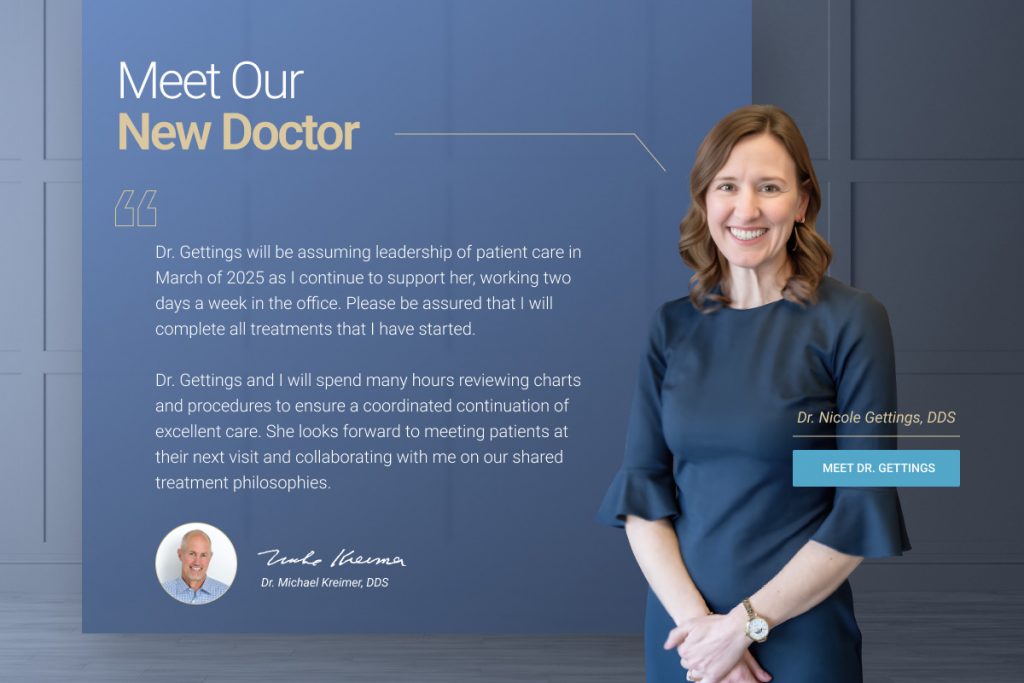Partner with Michael Kreimer, DDS Family and Implant Dentistry for Optimal Gum Health
Gum disease, also known as periodontal disease, is a prevalent but serious condition that affects the gums and the supportive structures of the teeth. Its origins lie in bacterial accumulation from plaque, leading to inflammation and infection. Without prompt treatment, gum disease can escalate, resulting in significant oral health issues, including tooth loss and other systemic health complications.
At Michael Kreimer, DDS Family and Implant Dentistry in Loveland, OH, we prioritize your oral health and are dedicated to providing the necessary treatments and education to combat gum disease effectively. Call our Loveland dentist at (513) 677-3656 to learn more about our periodontal treatments.
What Is Gum Disease?
Gum disease encompasses a range of conditions that affect the gums, primarily the result of poor oral hygiene that allows plaque—a sticky film of bacteria—to build up on teeth and harden into tartar. Every individual is susceptible to gum disease, but certain factors can increase the risk, such as genetics, smoking, hormonal changes, and systemic conditions like diabetes. Gum disease is a progressive condition that can develop through several stages; thus, understanding it is vital for effective prevention and treatment.
The Stages of Gum Disease
Monitoring the progress of periodontal infection is important for patients to know what kind of treatment to seek, whether periodontal disease is still reversible, and how soon to seek treatment. The stages of gum disease include:
- Gingivitis: This is the initial and mild form of gum disease characterized by red, swollen, and bleeding gums, particularly during brushing or flossing. It is often reversible with proper care and professional attention.
- Periodontitis: If gingivitis remains untreated, it can progress to periodontitis, marked by worsening gum inflammation and the creation of pockets between the gums and teeth. This stage can cause significant damage to the bone supporting the teeth, leading to tooth mobility.
- Advanced Periodontitis: This is the most serious stage of gum disease, where the disease has severely damaged the gums, bone, and supporting structures, often resulting in tooth loss.


Treatment for Gum Disease
Our dental practice provides a comprehensive range of treatments to address gum disease at all stages:
Professional Dental Cleanings
Regular professional cleanings at Michael Kreimer, DDS, enable us to remove plaque and tartar accumulation, preventing the progression of gum disease. A dental hygienist will use specialized tools, including ultrasonic scalers and hand instruments, to thoroughly clean your teeth and gums. This process not only eliminates the buildup that ordinary brushing and flossing may miss but also helps to reduce inflammation, setting a foundation for healthier gums. The frequency of these cleanings can be adjusted based on your gum health, ensuring a personalized approach to maintaining your oral hygiene.
Scaling and Root Planing
Scaling and root planing is a deep cleaning procedure essential for treating moderate periodontal disease. During scaling, the dentist removes choked plaque and calculus from above and below the gum line with specialized instruments. Root planing follows to smooth the root surfaces, facilitating better gum reattachment and helping to eliminate the toxins produced by bacteria. This therapy effectively reduces gum pocket depth, enhances overall gum health, and promotes healing, allowing the gums to return to a healthier state over time.

Laser Periodontal Therapy
Laser periodontal therapy offers a minimally invasive treatment option for patients dealing with gum disease. This cutting-edge technology employs focused laser energy to target and eliminate infected gum tissue while preserving healthy tissue. Compared to traditional methods, laser therapy often results in less pain, reduced bleeding, and a shorter recovery time. The laser’s precision allows for targeted treatment of gum pockets, promoting tissue regeneration and healing while minimizing discomfort during and after the procedure.
Bone and Gum Grafting
Advanced cases of gum disease may necessitate bone and gum grafting procedures to restore lost tissue and bone structure. Bone grafting involves replacing lost bone with material taken from your body or a donor source to promote new bone growth. Gum grafting addresses gum recession by adding tissue to the affected area, repairing the gumline and providing protection to the roots of the teeth. These procedures not only restore the aesthetics of your smile but also help secure teeth in their proper positions, preventing future mobility and loss.
Antibiotic Therapy
In situations where bacterial infection persists despite regular cleaning, antibiotic therapy can be an effective adjunct to other treatments. This treatment may involve the application of localized antibiotics directly to the infected areas or oral antibiotics to tackle systemic infection. The antibiotics work to reduce the population of harmful bacteria in the mouth, thereby slowing down the disease progression. This approach can significantly enhance the efficacy of non-surgical treatments and is often part of a comprehensive gum disease management plan.
Surgical Options for Periodontitis
For patients with advanced gum disease, surgical intervention becomes necessary to restore gum health. Surgical procedures may include pocket reduction surgery, where the gums are lifted back to allow better access to the roots of the teeth for thorough cleaning. Additionally, regenerative surgery can help regain lost bone and tissue, promoting natural restoration of support structures.
Though surgery may seem intimidating, our team goes to great lengths to ensure patient comfort and provide assurances throughout the entire process, leading to improved long-term outcomes.

Importance of Prevention
The adage “prevention is better than cure” holds particularly true in dentistry. Effective preventive strategies to avoid gum disease include:
- Practicing good oral hygiene: Brush twice daily and floss daily to remove plaque from all tooth surfaces.
- Regular dental check-ups: Visiting our Loveland office for routine examinations helps in early detection and treatment of potential dental issues.
- Balanced diet: Limiting sugary foods and drinks can reduce plaque accumulation.
- Identify risk factors: Understanding what habits, past procedures, illnesses, etc. present an increased risk for gum disease can help you eliminate harmful practices and schedule more frequent checkups when necessary.
Costs of Gum Disease Treatment
Costs associated with treating gum disease vary significantly based on the severity of the condition. More severe cases may require extensive treatments, typically ranging from $1,700 to over $8,000. Regular assessments and early interventions can help minimize these costs, making preventive care crucial.
Frequently Asked Questions
Can gum disease be prevented?
Yes, gum disease can be largely prevented through consistent oral hygiene practices, including brushing twice a day, flossing daily, and scheduling regular dental cleanings.
How do I know if I have periodontal disease?
Symptoms include bleeding, swollen gums, persistent bad breath, and sensitivity in the gums when brushing or flossing. If you notice any of these issues, contact your dentist for an evaluation.
Is gum disease contagious?
While gum disease itself is not contagious, the bacteria that contribute to it can be transmitted through saliva. Maintaining good oral hygiene is essential to prevent the spread of bacteria.
Can gum disease cause other health problems?
Yes, gum disease has been linked to various systemic health issues, including heart disease and diabetes. It’s important to treat gum disease to reduce the risk of these associated conditions.
What are the signs of advanced periodontal disease?
Advanced periodontal disease may present as severe gum recession, loose teeth, extensive bone loss, and persistent pus between the gums and teeth. Seeking prompt treatment is vital to prevent tooth loss.
Let Dr. Kreimer Help You Achieve Optimal Dental Health
Healthy gums are essential for a healthy smile. At our Loveland dental practice, we focus on effective treatments tailored to each patient’s unique needs. Remember, early detection is critical in managing gum disease, so don’t wait for symptoms to worsen.
Contact us now at (513) 677-3656 so we can guide you on your journey to better gum health. We serve Loveland and the surrounding areas, including Cincinnati, Dayton, and Springdale. Your oral health matters, and we are here to support you every step of the way!


